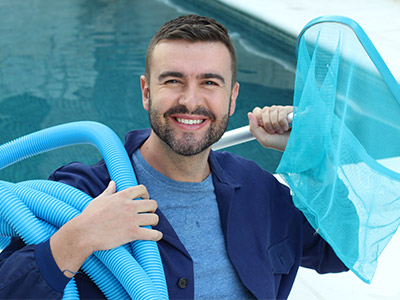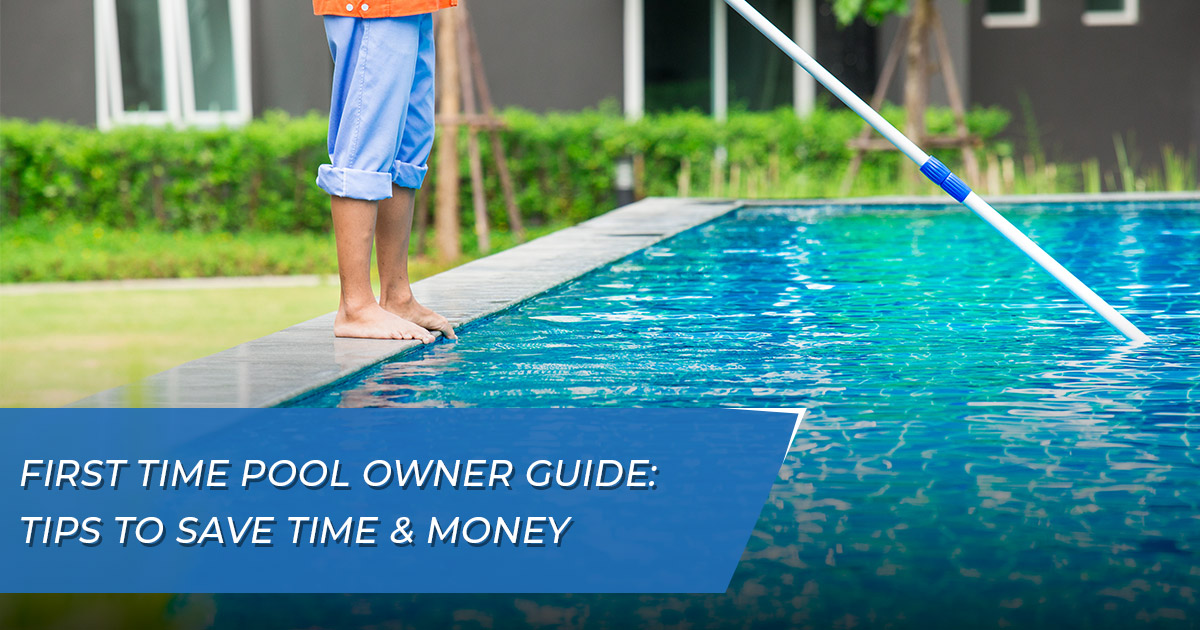First Time Pool Owner Guide: Tips to Save Time & Money
Owning a brand-new swimming pool can be an exciting experience. But it can also be overwhelming – particularly once you consider the equipment you’ll need to purchase and the maintenance that needs to be completed regularly.
But don’t worry; the process is more straightforward than it might appear initially. It is possible to enjoy all the benefits of being a new pool owner with as few potential downsides as possible. You need to keep a few key things in mind along the way.
First Time Pool Owner Essentials List
 By far, the most important thing you need to understand as a first time pool owner involves the type of equipment that you’ll need to keep everything operating at its best. In terms of the essentials for pool care, you’ll need access to the following:
By far, the most important thing you need to understand as a first time pool owner involves the type of equipment that you’ll need to keep everything operating at its best. In terms of the essentials for pool care, you’ll need access to the following:
- A telescopic pole.
- A brush attachment.
- A skimmer attachment.
- A pool vacuum.
- A pool water testing kit.
- An alkalinity increaser (baking soda will work).
- An alkalinity decrease (otherwise known as a dry acid).
- A pH increaser (many people use soda ash).
- A pH decrease (which can be dry acid OR muriatic acid, but it is best not to use both).
- A calcium hardness increaser (otherwise known as calcium chloride).
- Chlorine tablets (which can be granular, liquid, or salt water chlorinators).
First Time Pool Owner Tips & Suggestions
The list below is everything you need to minimize the time it takes to maintain your pool and maximize how much you enjoy it.
Use a Variable Speed Pool Pump
One of the best steps to make things easier as a first time pool owner is to use a variable-speed pool pump with your pool. When using a fixed-speed model, you’re dealing with something that cannot be changed. A variable speed pump, by its nature, offers a lot more in the way of freedom and flexibility.
For example, when you use your pump at the low setting, you’re getting the absolute best energy efficiency per month. If you suddenly find that your pool is green and cloudy, you can always switch it to the high setting, allowing it to clear up that water in no time.
You can even choose to optimize the efficiency of the pool pump based on the number of swimmers that will be present. If you know that it’s just you, you can use the low speed, and there won’t be much in the way to worry about. If you’re hosting a backyard get-together with numerous people present, it will likely be more efficient to stick to a higher setting. Simply having the option to go back and forth won’t just make for a better pool experience. It can also help save you a tremendous amount of energy (not to mention money).
Related Article: Variable Speed Pool Pump Benefits: Are they Worth It?
Pick the Right Type of Pool Heater
Another one of the most critical steps to take as a new pool owner involves knowing what type of pool heater you will need to meet your expectations.
During your research, you likely encountered two key terms: pool heaters and pumps. While both do similar things – that is to say, they heat the water in your pool – they do so in different ways and should not be treated as alternatives to one another.
Pool heaters do precisely what the term implies – they use energy (usually via electricity or a natural gas source) to heat the water in your pool directly. Pool heat pumps, on the other hand, extract heat from the surrounding air to warm the pool’s water to the desired temperature.
The benefit of a pool heater is that it is fast. All you have to do is set your desired temperature, wait a short amount of time, and your pool’s water is exactly where you want it to be. The downside is that you’ll be at the mercy of fluctuating energy prices, which can be relatively expensive if energy costs happen to spike in your area.
A pool pump may be a more expensive one-time cost than a pool heater, but you’ll likely save money in the long run. You’ll have to wait a bit longer for your pool water to get to the desired temperature, but you won’t have to purchase new propane tanks or fluctuating electricity prices constantly.
In some situations, first time pool owners choose both of these methods at once. They use a pool heater when they need their pool water to be at the desired temperature quickly while using a pool heat pump for virtually everything else. Whether that makes sense for your particular circumstance is a question only you can answer.
Related Article: 4 Swimming Pool Heater Options To Enjoy Swimming All Year
Pick the Right Type of Filter
As a new pool owner, one critical thing you should know is picking the correct type of pool filter. Again, they all have similar goals, but they go about their task differently.
A cartridge pool filter, for example, offers the lowest water usage out of all the variants on the market today. They offer solid filtration and are easy to clean. They have a shorter overall lifespan, though, which means that you’ll be buying replacements regularly.
Sand pool filters are also known for low maintenance and cost. However, you should know that they are also the least sensitive in terms of their overall filtration capabilities.
DE pool filters offer the most significant level of filtration out of all options you can buy. They are also known for their long lifespan, meaning you’ll change them out less frequently. They have a high cost, though, and are also known to have somewhat high maintenance requirements (at least when compared to the other options), so these are all things you should keep in mind when choosing which option to go with.
Related Article: Pool Filter Types: Why You Should Know the Differences
Implement a Pool Maintenance Schedule
Another one of the most critical steps that you can take as a first time pool owner involves implementing an appropriate pool maintenance schedule to meet your needs. Note that you can do this on your own or with a dedicated provider like the team at GPS Pools.
At least two times per week, you should brush and skim your pool to keep it free of dirt and debris. Once you do so, you should also vacuum your pool for maximum effect. On the same weekly basis, you should test and balance your pool water chemicals. This is also an excellent opportunity to shock your pool and keep the water as clean as possible.
You’ll also want to empty the skimmer and the pool pump every week. On an annual basis, you’ll also need to have your pool heater and other pool equipment serviced by a team of professionals.
Keep Your Pool Chemicals Balanced
Anyone who has done a modicum of research into being a new pool owner knows that keeping your pool chemicals balanced – particularly chlorine – is essential. But knowing the breakdown is ultimately the key to ensuring your water stays precisely how you want it to.
For example, if you have an outdoor pool, you’ll want to use stabilized, 3-inch chlorine tablets regularly. Put them right into the skimmer basket – don’t just drop them into the pool itself. This will ensure that the chlorine is distributed evenly, flowing through the system thoroughly to ensure maximum sanitation.
The total number of tablets you use should be based on the size of your pool. For example, if your pool is between 2,500 and 5,000 gallons, you’ll want to use one chlorine tablet weekly. If you have a 7,000-gallon pool, you’ll want to use between one and two tablets as needed.
On the other end of the scale, you have a larger 20,000-gallon pool. Here, you would want to use between three and four chlorine tablets as needed every week. If you have any questions about how many chlorine tablets you should be using to ensure that your pool’s chemicals are balanced, along with the type, feel free to consult the experts at GPS Pools.
Related Article: How to Maintain a Swimming Pool: Getting the Chemistry Right
Use a Robotic Pool Cleaner
A robotic pool cleaner is a good idea because it can clean your pool faster and more efficiently than a suction cleaner. They function independently of your pool pump and the more extensive pool filtration system and are also straightforward to use. This, coupled with the reduced costs that they’re known for, make it an opportunity that is far too good to pass up.
Once you have a chance to use a robotic pool cleaner, you’ll quickly begin to wonder how you could get by without one. At the very least, it will save you a lot of money on the cost of having a professional clean your pool’s water regularly. It will also make it easier to get your water ready for guests when the need arises.
Related Article: Robotic Pool Cleaners: What Are The Benefits?
Automate Your Pool Equipment
Finally, one essential concept that you should embrace involves the idea of automation. Anyone who has owned a pool for an extended period can tell you that maintenance eats up a lot of their day. That sparkling clear water doesn’t just create itself – a fair amount of work is required to get there. The more of those tasks you can automate, the more time you can spend enjoying the water whenever you want.
Take automatic pool chlorination systems, for example. They’re adept for salt water chlorination, which is known to offer some of the softest, most refreshing pool water you’re likely to come across. They generate chlorine on the go, using a specialized cell and pool salt. You don’t have to worry about keeping to a regular chlorination schedule, as the system takes care of it. This, along with using things like robotic pool skimmers as outlined above, will free up a lot of your valuable time, so you can spend less time working on your pool and more time enjoying it.
Related Article: The Benefits of Swimming Pool Automation
GPS Pools Makes Being a First Time Pool Owner Easy
If you’re a new pool owner, don’t worry – the team at GPS Pools is here to help. Not only do we offer all the pool equipment you’ll need to keep your water looking perfect, but we also consult on everything you should know to avoid issues down the road. We’ve proudly offered our services to countless clients in Odessa, Pebble Creek, Tampa Palms, Wesley Chapel, Seven Springs, Keystone, Lake Fern, and more, from one of our locations in New Tampa, Lutz, and Land O’ Lakes and can’t wait to do the same for you, too.

